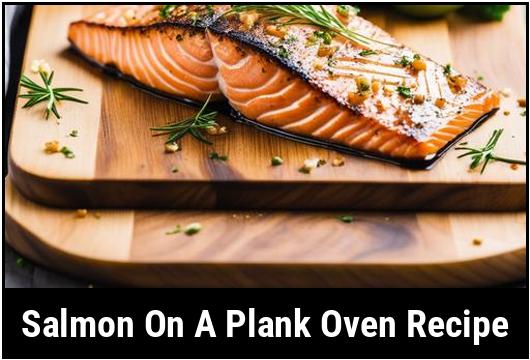
Salmon On A Plank Oven Recipe: The Ultimate Guide
If you’re looking for a delicious and impressive way to cook salmon, look no further than the classic plank oven recipe. Not only does this method infuse the fish with a smoky flavor, but it also looks pretty cool on the table.
In this comprehensive guide, we’ll cover everything you need to know to cook perfect salmon on a plank in the oven. From selecting the right plank to checking for doneness, we’ve got you covered.
Food Science: Why Cook Salmon on a Plank?
Cooking salmon on a plank is more than just a gimmick. There’s a real science behind it. The wood plank helps to infuse the salmon with smoky flavor and moisture while protecting it from direct heat. As the plank heats up, it releases aromatic oils that infuse the fish with flavor. The moisture from the wood also helps to keep the salmon moist and tender.
Culinary Details: Choosing the Right Plank
Choosing the right plank is an important step in cooking salmon on a plank in the oven. You want a plank that is untreated and free of chemicals that could be harmful to your health. Cedar, alder, and hickory are all good choices.
Size is also important. Your plank should be big enough to accommodate the size of your fish. Typically, a 14-inch plank is sufficient for a 2-3 pound salmon fillet.
Cleaning: Preparing the Plank
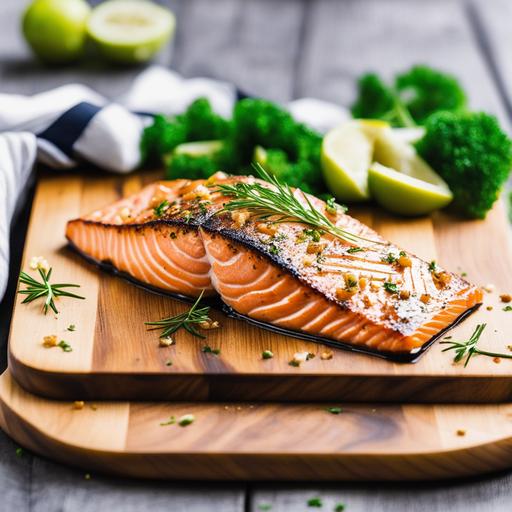
Before using your plank, it’s important to soak it in water for at least an hour. This will help prevent it from catching fire in the oven. You can also add some wine, beer, or herbs to the water for added flavor.
After soaking, brush the plank with olive oil to prevent the fish from sticking. This will also help to infuse the wood with flavor.
Preparation: Preparing the Salmon
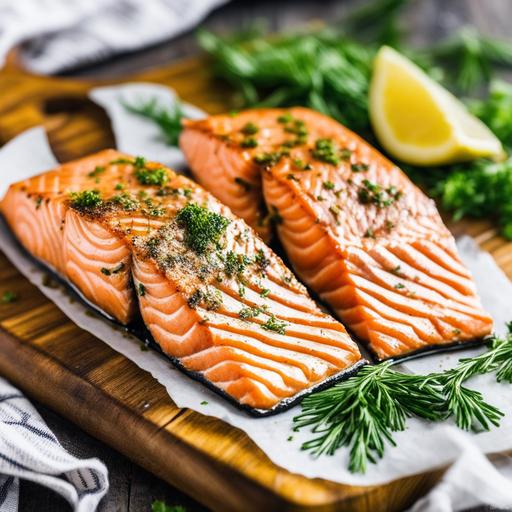
When it comes to preparing the salmon, simple is best. Season it with salt and pepper, and let the flavor of the wood plank shine through.
If you want to add some extra flavor, you can lay some thinly sliced lemons or herbs on top of the salmon before cooking. This will infuse the fish with even more flavor.
Tips: Cooking the Perfect Salmon
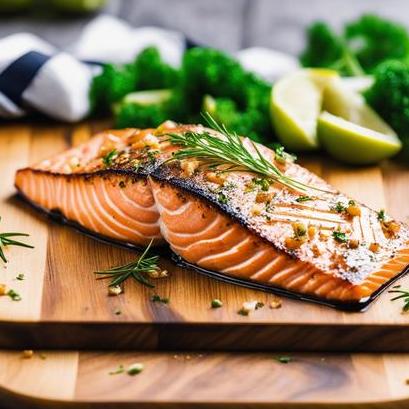
Cooking salmon on a plank in the oven can be tricky. Here are a few tips to help you get it right:
-
Keep an eye on the plank to make sure it doesn’t catch fire. If it does, move the plank to a cooler part of the oven.
-
Preheat the oven to 400 degrees Fahrenheit before adding the plank.
-
Check the salmon for doneness by inserting a knife into the thickest part of the fish. If it comes out easily and the flesh is opaque, the salmon is cooked through.
-
Don’t overcook the salmon. It should be moist and tender, not dry and rubbery.
Variations: Adding Some Variety
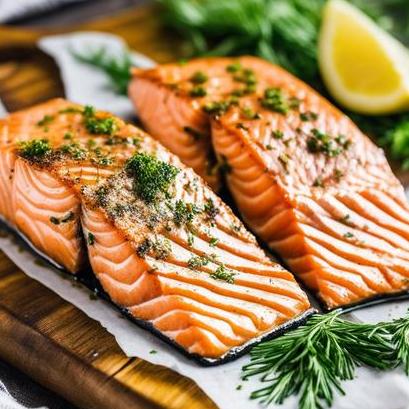
While a simple salt and pepper seasoning is delicious, there’s no reason you can’t experiment with some other flavors. Here are a few ideas to get you started:
-
Brush the salmon with a mixture of mustard and honey for a sweet and tangy flavor.
-
Top the salmon with a mixture of breadcrumbs and herbs for added texture.
-
Drizzle the salmon with a mixture of olive oil, lemon juice, and garlic before cooking for a Mediterranean flavor.
Recipe: Salmon on a Plank Oven Recipe
Now that you know all the details, here’s a recipe to get you started:
Ingredients:
-
1 untreated cedar plank
-
2-3 pound salmon fillet
-
Salt and pepper
-
1 lemon, thinly sliced
Instructions:
-
Soak the cedar plank in water for at least an hour.
-
Preheat the oven to 400 degrees Fahrenheit.
-
Brush the plank with olive oil and place the salmon on top of the plank.
-
Season the salmon with salt and pepper, and lay the lemon slices on top.
-
Place the plank in the oven and cook for 20-25 minutes, or until the salmon is cooked through.
-
Check for doneness by inserting a knife into the thickest part of the fish. If it comes out easily and the flesh is opaque, the salmon is cooked through.
-
Serve immediately.
Overcooked or Undercooked?
The biggest mistake you can make when cooking salmon on a plank is overcooking it. If you leave it in the oven for too long, it will become dry and rubbery.
On the other hand, undercooked salmon can be unsafe to eat. Make sure to check for doneness by inserting a knife into the thickest part of the fish. If it comes out easily and the flesh is opaque, it’s ready to eat.
Conclusion
Cooking salmon on a plank in the oven is a classic technique that never goes out of style. It’s easy, delicious, and looks pretty impressive on the table. By following these tips and tricks, you’ll be able to cook perfect salmon on a plank every time. So go ahead and give it a try – your taste buds will thank you!
Sources
FAQS On Salmon On A Plank Oven Recipe
How Long Does It Take To Cook Salmon On A Plank In The Oven?
The cooking time for salmon on a plank in the oven can vary depending on the thickness of the fish and the desired level of doneness. As a general guideline, a one-inch thick salmon fillet typically takes about 18-20 minutes to cook at 400°F (200°C).
Do I Need To Soak The Plank Before Using It?
Yes, it is necessary to soak the plank before using it in the oven. Soaking the plank for at least 1-4 hours (or overnight) before cooking will help prevent it from catching fire and ensure it produces a flavorful, aromatic wood smoke during cooking.
Can I Reuse The Plank After Cooking?
It is possible to reuse the plank after cooking, depending on its condition. If the plank is still in good shape and hasn’t burned or charred significantly, you can rinse it with water and scrub off any residual food particles. However, if the plank has become too charred or brittle, it is best to replace it with a new one for the next cooking session.
Can I Use Cedar Or Other Types Of Wood For Cooking Salmon On A Plank?
Absolutely! While cedar planks are most commonly used for cooking salmon, you can experiment with different wood flavors to suit your taste preferences. Alder, maple, hickory, cherry, and oak are some other popular choices that can impart unique flavors to the fish. Check the wood’s suitability for cooking and ensure it is untreated and intended for culinary use.
How Can I Prevent The Salmon From Sticking To The Plank?
To avoid the salmon sticking to the plank, you can lightly oil the plank or place the salmon on a bed of sliced lemons or vegetables. This creates a protective layer between the fish and the plank, preventing direct contact and reducing the likelihood of sticking.


